‘It is impossible that you should not have sensed,’ wrote Wagner to Ludwig II shortly before the first performance of Die Meistersinger von Nürnberg, ‘under the opera’s quaint superficies of popular humour, the profound melancholy, the lament, the cry of distress of poetry in chains, and its reincarnation, its new birth, its irresistible magic power achieving mastery over the common and the base.’ The King, and anyone else, might well not sense that in the latest revival of Graham Vick’s production of the opera at Covent Garden.
Always a toy-town affair, with little high-roofed houses and distant spires, all lit in glowing colours, and an oppressive cheerfulness reigning over all the characters, it has now become at best cute and often a lot worse than that. ‘I feel as if I’m about to drown in Gemütlichkeit,’ someone said to me in the second interval, and I saw what he meant, though I was feeling unusually gemütlich myself. Even the brawl at the end of Act II, which should be terrifying, not only in its suddenness but also in its brutality, is mostly a romp, though David clobbered Beckmesser with moderate enthusiasm.
If you prod Die Meistersinger at virtually any point, you see that it is dealing with the relationship between surfaces and depths, even Beauty and Truth, and the place that art, and especially new, novel art has in relationship to these troublesome couples. Art is illusion — Sachs says in his marvellous scene with Walther in Act III that all art is true interpretation of dreams — but so is everything else that we usually deal with, so it is the job of the reflective person, such as Sachs, to distinguish between good and bad illusion, to foster the first and if possible eliminate the second.








Comments
Join the debate for just £1 a month
Be part of the conversation with other Spectator readers by getting your first three months for £3.
UNLOCK ACCESS Just £1 a monthAlready a subscriber? Log in